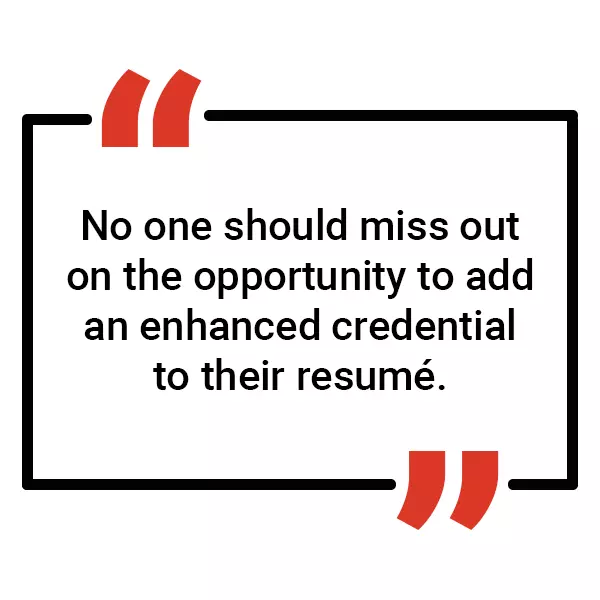After 22 years in the industry, here’s what I know about professional development and boot camps

Written by Dr. Patrick C. Horton

Why consider boot camps and professional development opportunities

As its name suggests, professional development is an excellent way to learn a functional discipline that enhances your career, especially if you work in business or technology. It can take all kinds of forms, from coding boot camps to certificates to courses, and it can be both a means to an end (as in preparing for certification) or an end in and of itself (by teaching skills you can use immediately)
After 22 years in IT, I know the value of professional development both personally and professionally. I not only have worked with colleagues and been mentored by individuals who have demonstrated the advantages of professional development, but I also have committed myself to the same over the years as part of my career development plan.
Education has its place in career development, of course. But no one should miss out on the opportunity to add an enhanced credential to their resumé — as long as it offers real value to their career and industry. So many college graduates make the mistake of thinking, “Hey, I have a reputable four-year degree. I don’t need to invest in continuing education and professional training.”
But in thinking that, they miss a strategic advantage. Targeted knowledge acquisition can be key to becoming a knowledgeable resource in your field. Here’s what you need to know about professional development.

Boot camps and professional development: What to expect
Whether you’re looking to move into a new role at work, grow your professional network or even launch a new career, professional development and training boot camps have the power to help you reach your goals.
Professional development often follows a model of learning in which participants focus on a specific subject for an intense period of time with the objective of mastering that subject. Courses and boot camps typically last about one workweek, or 40 hours. In my experience, the best of these condense about eight weeks of training into that time frame.
Topics run the gamut from project management to coding and programming. And don’t be intimidated! You usually need little to no experience in whatever topic your course is teaching. The idea is to be proficient or have knowledge in the field after the course is completed.
While working as the country manager of the SPAWAR Free Internet Café Program for U.S. troops in Afghanistan, I dreamed of becoming a program manager. To become a program manager, I needed to pass the highly regarded Project Management Professional (PMP)® certification exam.
How to pass a certification exam
If you take a look at my LinkedIn® profile, you’ll notice that I have earned the PMP, PgMP, PfMP, ITIL v3, CCNA, Security+, CISSP and several other professional certifications throughout my career, all because of professional boot camps. You could say I know a little something about how to pass a certification exam.
Certification exams are often extremely difficult and time-consuming. The PMP exam is a 200-question, four-hour exam. Sounds rough, but back when I took the CISSP, it was a six-hour, 250-question exam. Consider yourself lucky!
What I’m not ashamed to say is that I failed the PMP exam two times before I passed. I also failed the CISSP one time before I passed. That means I have the knowledge and experience to help you figure out what not to do and how to pass those exams.
The first time I took the PMP, I downloaded a video prep course, watched it one time and went to Dubai to take the exam. I paid the $500 exam fee, plus the airline ticket and hotel fees just to completely bomb it. Please don’t do this. It was a truly painful hit to my wallet and ego. I knew as soon as the test began that the material was way over my head. So, I essentially took the exam to get a feel for the difficulty.
The second time I took the PMP exam, I really studied. I purchased a dedicated preparation video, books, flash cards and a test simulator series, and I studied for three months. I read the required reading and watched the video series twice and completed enough practice exams to where I felt confident. Basically, I worked until I felt that I wasn’t going to gain any more knowledgeable about the subject.
Then I went to Stuttgart, Germany, on a work trip before traveling to Dubai to take the PMP exam again. I fought my way through that second-try PMP exam. After countless hours of studying and four hours taking the exam, I failed by two questions. I was absolutely bereft.
Do you know what it feels like to study for four months and take a four-hour exam only to fail it — again? It sucks.
My lightbulb moment: I needed a bootcamp
So, there I was: a two-time failure because of my cockiness and lack of sufficient prep. I was over eight months in, I’d spent over $5,000 and I didn't even have the certification. I’d finally had enough of amateur hour and going it alone. I knew I needed a boot camp.
With PMP, you have three tries and one year to pass the exam or you have to reapply. That’s what led me to the realization that no man is an island: Everyone I knew who had passed the exam the first time went to the PMP boot camp. I already valued education and knowledge sharing, so why hadn’t I taken the course like others? Hubris had led me astray.
I finally buckled down and did the following to pass the exam:
1. Registered for the official PMP boot camp
2. Purchased the official PMP guide
3. Purchased an all-in-one PMP video series, which included a 3,000-question test bank and an exam prep book
4. Scheduled my test for the day after the boot camp
The PMP boot camp was amazing. It was led by an oil-refinery executive out of South Africa who had run $500 million programs and was a certified Project Management Institute instructor with the PMP certification (more on the institute below). After five days of expert knowledge on what to expect and how to pace myself during the exam, I took the test the day after the boot camp and passed with flying colors.
4 benefits of boot camps and professional development
So, in the end, was it all worth it? Yes! The journey to earning my certification may not have been the easiest, but my accomplishment and how it has impacted my career have been invaluable. Here are a few additional benefits of boot camps and professional development courses.
1. Expert trainers
A major draw for many participants is the opportunity to learn from industry experts who work around the world. And, like you, other motivated professionals in your industry will be attracted by that knowledge. That means that, in addition to gaining relevant skills and knowledge from leaders in your field, you can also join a community of like-minded professionals, develop collaborative skills and pick up the latest intel about your functional job market.
Also, because training camps are designed for small class sizes (think anywhere from five to 15 people), you get dedicated attention from experts who, in my experience, are often vested in helping you both inside and outside the boot camp or class.
2. Industry certification preparation
Certification exams can be extremely difficult and time-consuming. (Witness my experience with the PMP exam.) If you’re considering pursuing a certification, boot camps and dedicated courses can be a wise option. Trained professionals lead those courses, strategically guiding participants in learning how to answer exam questions.
Compare that to studying on your own. How do you begin to prepare? How do you know what to study, how to study or when to study? Boot camps can help mitigate the risk of wasted time and effort.
3. An expanded professional network
Professional boot camps can take place pretty much anywhere, from all 50 states to Europe, Asia and beyond. This means participants get the chance to learn alongside industry professionals from around the world who often have multifaceted backgrounds that offer new perspectives on the subject matter.
4. Career enhancement
Professional development training and certifications are not just nice to have. For some roles, they are necessary to have. In my experience, organizations may require candidates to be PMP certified before they can be hired on as project, program or portfolio managers. Another example: To work on Cisco Networking equipment with some government agencies, you must have both a Security+ and a Cisco Networking certification.
How to find reputable professional development opportunities
One example of a well-known and respected professional development organization is the Project Management Institute (PMI), which offers a variety of certifications for project managers. PMI is a nonprofit organization whose global network of professionals set industry standards through certified education and development, and by conducting research and facilitating professional conferencing.
PMI is one, but there are other reputable options, including:
- The International Information System Security Certification Consortium, or (ISC)2 (e.g., CISSP certification)
- Cisco Networking (e.g., CCNA certification)
- VMware (e.g., VMware Certified Professional)
- Amazon Web Services (e.g., AWS Certified Cloud Practitioner)
- Microsoft (e.g., MCSE)
- CompTIA (e.g., Security+)
The evolution of professional training and boot camps
Professional development and boot camps have experienced increased growth and success because they provide industry skill sets that are in high demand.
A great way to distinguish a reputable program from the rest is to find an authorized training partner of the certification body you are employing to assist in your credential journey. For example, PMO Advisory is an authorized training partner of the Project Management Institute.
Is professional development right for you?
Professional training and boot camps offer value to workers of all ages and backgrounds as long as they are seeking greater knowledge and career enhancement. A certificate or a certification, whether it’s earned after high school or college graduation, during a career change or at mid-career, brings enhanced knowledge, wider networking potential and proof to employers that you have industry expertise. What you make of that is up to you.
Read more articles like this:
ABOUT THE AUTHOR
Dr. Patrick C. Horton, MBA, DM/IST, is the vice president of program management for Tampa Microwave, a college professor and a veteran U.S. Army sergeant. He earned his Bachelor of Science in Information Technology, his Master of Business Administration and his Doctor of Management with a specialization in Information Systems at University of Phoenix. Dr. Horton launched his business, Professional Career Transformations, in 2021 as a way to guide and encourage others to higher levels of professional success. He is a member of Vistage Executive Coaching Group and a recipient of the Purple Heart in Operation Iraqi Freedom, and he lives in sunny Florida. Learn more about Dr. Horton and his commitment to helping others achieve their highest level of success by visiting his website.
The views expressed in this article are those of the author and do not necessarily reflect the advice of University of Phoenix.


